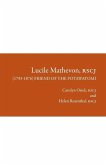When Dietrich Bonhoeffer was led into the courtyard of the concentration camp at Flossenburg on April 9, 1945, to be hanged, few would have guessed that his writings, indeed his most personal thoughts and fears, would attain worldwide fame and marked influence in just a few years. How did this happen? Much of the credit goes to Bonhoeffer's close friendship with his student and colleague Eberhard Bethge, says theologian John de Gruchy. It was Bethge to whom Bonhoeffer wrote most frequently from prison, he with whom he discussed his emergent theological writing, and he who organized and published the writings that would fall like a bombshell on the English-speaking religious world after World War II. In many respects, Bethge, working with his wife--Bonhoeffer's niece, Renate--was responsible for creating and shaping the reception of Bonhoeffer and his work. In this important and fascinating work, this Bonhoeffer expert narrates the course of that friendship, building on interviews and newly available primary sources. It provides testimony not only to a powerful friendship but to the eventual vindication of the life sacrificed that early spring morning.








